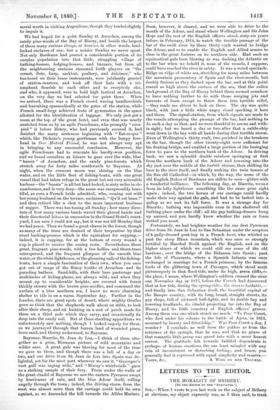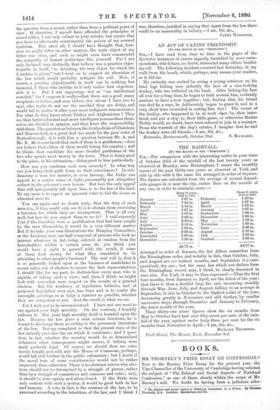LETTERS TO TIIE EDITOR.
THE MORALITY OF BRIBERY.
[TO THE EDITOR OF THE SPIICTATOR.1
Sia,—When I wrote to you last week on the subject of Bribery at elections, my object expressly was, as I then said, to treat the question from a moral, rather than from a political point of view. If, therefore, I myself have offended the principles of sound ethics, I not only submit to your rebuke, but rejoice that you have so effectually counteracted the poison of my avowed cynicism. But, after all, I should have thought that, how- ever we might differ on other matters, the main object of my letter was clear, and such as might even have commanded the sympathy of honest politicians like yourself. For I not only declared very distinctly that bribery was a practice objec- tionable in itself, "as defeating the very object for which the franchise is given," but I went on to suggest an alteration of the law which would probably mitigate the evil. Now, of course, a practice objectionable in itself can be nothing but immoral, if those who indulge in it only realise how objection- able it is. But I am supposing—not as " an intellectual crotchet," for I suppose it really—that there are a good many recipients of bribes, and even bribers (for whom I have less to say), who really do not see the mischief they are doing, and would fail to realise it after your most indignant remonstrance. For what do they know about Turkey and Afghanistan ? They see that better educated and more intelligent persons than them- selves are divided in opinion, and they leave the responsibility with them. The question as between the rival policies of Gladstone and Beaconsfield, is a great deal too much for the poor voter of Rottenborough ; it is with him a question between Mr. A. and Mr. B. He is convinced that each of them is a gentleman,—does not believe that either of them would betray his country ; and he thinks that candidate the more decided gentleman of the two who spends most money in the town. That is doing good to the place, in his estimation,—doing good to him particularly.
How can you condemn such men severely In what way can you bring their guilt home to their consciences ? In con- demning a man for murder, or even larceny, the Judge can appeal to a native sense of right, presumably not altogether extinct in the prisoner's own bosom. But here the only appeal that will indisputably tell upon him, is to the law of the land. To say more is to expect an ignorant voter to feel the issues as educated men do.
You say again, and no doubt truly, that the duty of such men (i.e„ if they could only see it) is to abstain from exercising a function for which they are incompetent. That is all very well, but how do you expect them to see it? I said expressly fiat if the franchise were a qualification that had been sought by the men themselves, it would be a very different matter But if (to take your own illustration) the Hanging Committee. at the Academy were one-half composed of persons who took no interest whatever in Art, being selected at random from the householders within a certain area, do you think you would have a right to quarrel with the result, if some of them took money for what they considered to be attending to other people's business ? The real evil is, that it is so generally looked upon as the business of candidates to secure votes, not of electors to secure the best representatives I should like, for my part, to disfranchise every man who is capable of taking such a view ; and then, I think, we might look with somewhat more respect on the results of a general election. But the tendency of legislation hitherto, and of proposed legislation even now, has been and is to confer the unsought privilege on as laige a number as possible, whether they are competent or not. And the result is what we see.
Yet I wish not to be misunderstood. I have not one word to say against your high morality. On the contrary, I heartily endorse it. But your high morality itself is founded upon the law. Because the law gives a man certain functions, he is bound to discharge them according to the presumed intentions of the law. But my complaint is that the present state of the law actually provokes the sin which it condemns ; and I ques- tion, in fact, whether the country would be so demoralised (whatever other consequences might ensue), if bribery were made perfectly legal. Of course, we should then see votes openly bought and sold, and the House of Commons, perhaps, would fall still further in the public estimation ; but I doubt if the moral tone of some constituencies would not be rather improved, than otherwise. There is no abstract reason why elec- tions should not be determined by a struggle of purses, rather than by a struggle of committees and caucuses and votes ; only, it should be done openly and above-board. If the State were only content with such a system, it would be good both in law and honesty. A vote, in fact, is the creature of the law, to be exercised according to the intentions of the law, and I think I
was, therefore, justified in saying that apart from the law there could be no immorality in bribery.—I am, Sir, &c., JAMES GAIRDNER.



































 Previous page
Previous page